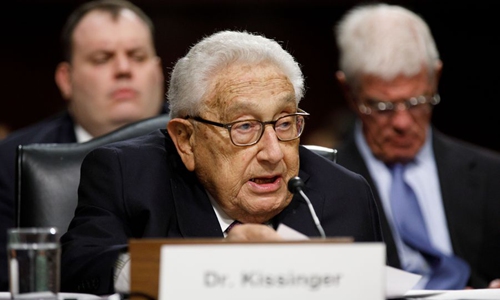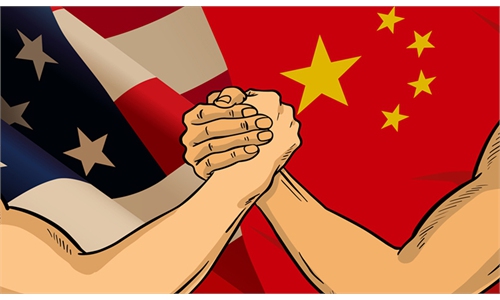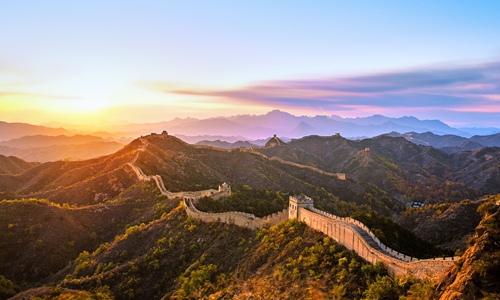
Former US Secretary of State Henry Kissinger (Front) speaks during a Senate Armed Services Committee hearing on Capitol Hill in Washington D.C., the United States, on Jan. 25, 2018. (Xinhua/Ting Shen)
Former US secretary of state Henry Kissinger attended a virtual discussion hosted by the Economic Club of New York on Wednesday. Kissinger stated, "Our leaders and their [China's] leaders have to discuss the limits beyond which they will not push threats, and then they have to find a way of conducting such a policy over an extended period of time." He continued, "If it's totally impossible, we will slide into a situation similar to World War I." This remark shows Kissinger's concern about the current China-US tensions and reflects the universality and seriousness of the hostility toward China in the US at present.
The Trump administration has explicitly identified China as a strategic competitor. They have engaged in a comprehensive competition with a campaign against China in economy, trade, technology, military and security. In this context, some US media outlets are clamoring for military action to seize China's islands and reefs in the South China Sea. Some American scholars even speculate that the US and China will ultimately engage in military conflicts over the Taiwan question. In this regard, Kissinger's concerns are reasonable.
However, Chinese people are generally confused by the US hostility toward China. This sudden change of attitude and policy is perplexing. After all, China has actively been participating in economic globalization and working hard to safeguard free trade for the last decades. It advocates peaceful development and diplomatic solutions to disputes, and strives to maintain stability and peace in its neighborhood and around the world. What's more, China follows the principle of "historic title" in international law to safeguard its sovereign rights and interests legally in the South China Sea. It also carries out normal infrastructure construction and defense deployment within its own sovereignty. And it is worth noting that these moves came after some countries violated China's territorial sovereignty and Washington put pressure on Beijing.
Chinese people believe that the Chinese government's moves are rational, legitimate and restrained - and that US' accusations are groundless. China has never pursued expansion or invasion, nor interfered in other countries' internal affairs, which totally differs from Western countries' approach before WWI.
US' hard-line policy and suppression against China stems from China's rising national strength and technological advance. This is what triggered American hegemonic angst. Since China's reform and opening-up in 1978, China's economic development has entered the fast lane. Its comprehensive national strength grows continuously.
The administration of former US president George W. Bush tried to crack down on China's rise. Yet the 9/11 attacks forced the US to adjust its global strategy. The 2008 global financial crisis gravely hit the economies of Western countries, including the US. By comparison, emerging countries represented by China rapidly got rid of its impact. China's economic strength and international influence has been markedly ramping up since then. As a consequence, some US political elites regard China as a threat to their global and regional dominance.
In recent years, as China has advanced its economy at a high speed, it has achieved rapid progress in technology. Its international status and influence has been enhanced. This deepens some US elites' fears and paranoia. The Trump administration sees China as strategic rival, and has launched all-round strategic competition with it as such. Factors like the US' mishandling over the COVID-19 and widespread racism have pushed certain American policymakers to pursue a hard-line stance and act with a heavy hand. Under the propaganda of some US politicians and media outlets, being tough with China has become a bipartisan consensus.
As a matter of fact, US views of China being either a potential or realistic strategic challenger did not begin with US President Donald Trump. But it is the Trump administration that has clearly made this wild shift and is trying to fundamentally adjust its China policy from engagement-centered to competition-oriented.
Besides exerting pressure on China in the realms of economy, military and security, Trump administration is turning technology, education and people-to-people exchanges into security issues. By shaping a negative image of China in the US and internationally, Washington is hyping up the "security threat" from China across the world.
British scholar Martin Jacques said at a virtual conference in July that there is an inability of the US to come to terms with the fact that it cannot continue as the world's sole hegemonic state. According to him, the US as number one is regarded as fundamental to its DNA.
Driven by such a mentality, some US politicians keep on provoking a major power confrontation. Such dangerous and irresponsible behavior brings no good to peaceful development and world stability.
The author is an associate research fellow with the National Institute of International Strategy at the Chinese Academy of Social Sciences. opinion@globaltimes.com.cn


